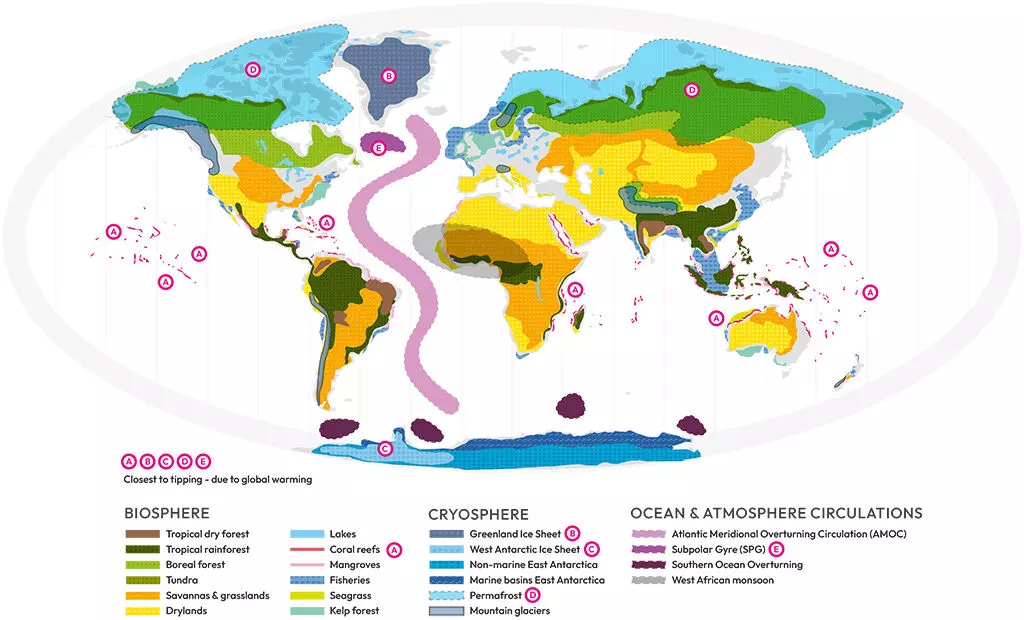Beyond the brink
The Global Tipping Points Report, 2023, warned of severe environmental stresses that could prompt significant parts of the natural world to undergo abrupt and irreversible changes

The average global warming of 1.2 degrees Celsius is pushing the world to the risk of crossing five tipping points, thresholds past which the Earth systems start to lose their resilience, thanks to climate change, overexploitation, and pollution among other drivers, a report by 200 scientists from 25 institutions said. The Global Tipping Points Report 2023, published by the University of Exeter, released on December 6, 2023, explained that environmental stresses could become so severe that large parts of the natural world would be unable to maintain their current state, leading to abrupt and/or irreversible changes.
Released at the International Climate Conference (COP28) in Dubai, the 'Global Tipping Points' report is the most thorough assessment ever done on the boundaries of natural systems, according to the scientists. These moments are called earth system tipping points. Scientists have identified over 25 Earth system tipping points in the cryosphere, biosphere, and in ocean and atmosphere circulations. The five major systems at risk include the Greenland and West Antarctic ice sheets, warm-water coral reefs, North Atlantic Subpolar Gyre circulation, and permafrost regions.
They said multiple drivers, from climate change to deforestation and nutrient pollution to air pollution, make the thresholds difficult to assess. Already, at today's 1.2 degrees Celsius global warming, tipping of warm-water coral reefs is likely, and we cannot rule out that four other systems may pass the tipping points: the ice sheets of Greenland and West Antarctica, the North Atlantic Subpolar Gyre circulation, and parts of the permafrost subject to abrupt thaw. The study said such an event will multiply the crises in the same way Covid-19 caused cascading stress to societies and economic systems globally, with unequal and unjust consequences. For example, the collapse of the Atlantic Ocean’s great overturning circulation, combined with global warming, could cause half of the global area for growing wheat and maize to be lost, the report said.
According to the report, global governance is currently inadequate to minimize tipping point threats and to do so equitably. Governance is needed across multiple scales to address the different drivers, potentially rapid changes and diverse, often irreversible, impacts of tipping points. The report stressed the need for a framework as an immediate agenda. Noting that 'business as usual' is over, the report cautioned that within the time it takes to undertake global emergency action, some earth systems may cross the threshold but all hopes were not lost.
Mitigating the risk is still possible by reducing vulnerability, and becomes ever more urgent because each manifestation of a tipping point threat diverts attention and resources to disaster response, eroding away some of our agency to tackle the underlying drivers. This increases the risk of triggering more earth system tipping points, creating a vicious cycle. The scientists noted that the challenges also provide an opportunity for coordinated strategic interventions to accelerate the transition of societies toward sustainability. They cited the "exponential uptake" of renewable energy worldwide as a positive step, which will, in turn, trigger more positive developments like low-cost batteries and advancements in storage technology.
The scientists recommended phasing out fossil fuel, strengthening adaptation and loss and damage governance, inclusion of tipping point thresholds in the nationally determined contributions, coordinated policies, and a global summit on tipping points to address the problems. Timothy M Lenton, Professor of Climate Change and Earth System, one of the authors of the report, said the world was "sleepwalking into a major existential risk. We can't ask incrementally. We have got to accelerate in shutting down greenhouse gas emissions”. Negotiators at the climate talks are discussing ways to address fossil fuel burning, the primary cause of global warming. The real danger lies in the fact that world leaders are still not taking climate change seriously and are paying lip service to eliminating the causes in climate conferences. The real drive from them is yet to come; that is very unfortunate and alarming as well.
Views expressed are personal




